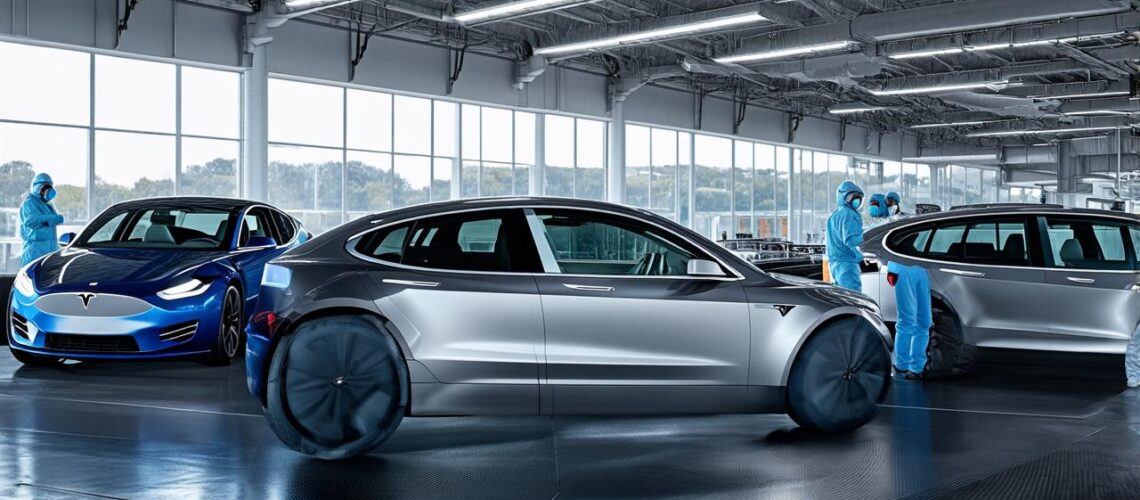Who is the owner of Tesla?

Tesla is a company that revolutionized the automotive industry by introducing electric vehicles and renewable energy products. Since its founding in 2003, the company has grown significantly, with a market capitalization of over $600 billion as of 2021. As a company manager, it’s essential to understand the ownership structure of Tesla and how it affects your business operations. In this article, we will explore who owns Tesla and its ownership structure in detail.
Ownership Structure of Tesla
Tesla is a publicly traded company, which means that its shares are available for purchase by the public through stock exchanges. The company is headquartered in California, United States, and has subsidiaries and operations worldwide.
Tesla’s ownership structure can be broken down into two main categories: common stockholders and shareholders of Class A and Class B stocks.
Common Stockholders
Common stockholders are the largest group of Tesla shareholders, owning over 70% of the company as of 2021. Common stockholders have voting rights in the company and can participate in shareholder meetings. They also receive dividends if declared by the board of directors.
Tesla’s common stock is listed on The NASDAQ Global Select Market under the symbol TSLA. As of April 7, 2021, the current market price per share of TSLA was $869.35.
Class A and Class B Stocks
Tesla’s ownership structure also includes Class A and Class B stocks. These are non-voting shares that do not have voting rights in the company or participation in shareholder meetings. However, they receive dividends if declared by the board of directors.
Class A shares were initially issued to raise capital for Tesla’s expansion in 2015. The company sold over 5 million Class A shares at a price of $35 per share, raising $175 million in funding.
Class B shares, on the other hand, were issued to Elon Musk and his affiliated entities as part of a compensation package in 2018. The company sold over 6.2 million Class B shares at a price of $422 per share, raising over $2.6 billion in funding.
Elon Musk currently owns around 37% of Tesla’s outstanding shares, making him the largest individual shareholder of the company. He also serves as CEO and CTO of Tesla.
Who Owns Tesla? A Look at Elon Musk’s Role
Elon Musk is widely regarded as one of the most influential figures in the tech industry. He founded several successful companies, including SpaceX and Neuralink, and has been involved in various projects, such as colonizing Mars.
Tesla was founded by Elon Musk and his brother Kimbal Musk in 2003 with the goal of accelerating the world’s transition to sustainable energy. Since then, Elon Musk has been instrumental in shaping Tesla’s direction and growth.

As CEO and CTO of Tesla, Elon Musk has overseen the development and production of electric vehicles, renewable energy products, and autonomous driving technology. He has also been involved in several high-profile projects, such as the Cybertruck and the Starship spacecraft.
Elon Musk’s influence on Tesla extends beyond his role as CEO and CTO. He is also a member of the board of directors and has significant voting power. He has used this power to shape company policies and decisions, including the acquisition of SolarCity in 2016.
Case Studies: How Elon Musk’s Ownership Influenced Tesla’s Success
Elon Musk’s ownership and involvement in Tesla have had a significant impact on the company’s success. Here are a few case studies that illustrate this point:
1. The Cybertruck
In November 2019, Elon Musk unveiled the Tesla Cybertruck at an event in Los Angeles. The electric pickup truck was a major hit and quickly became one of the most popular electric vehicles on the market. The success of the Cybertruck can be attributed to Elon Musk’s vision and leadership, as well as his ownership stake in the company.
2. Autonomous Driving Technology
Tesla has been at the forefront of autonomous driving technology for several years. The company’s Autopilot system, which uses cameras, sensors, and machine learning algorithms to enable self-driving, has been widely praised by customers and reviewers. Elon Musk’s ownership and involvement in Tesla have played a crucial role in the development and success of Autopilot.
3. SolarCity Acquisition
In 2016, Tesla acquired SolarCity, a solar panel manufacturer, for $2 billion. The acquisition was controversial at the time, with some critics questioning whether it made financial sense for Tesla. However, Elon Musk saw the acquisition as a way to expand Tesla’s reach into the energy market and accelerate the company’s growth. Today, SolarCity is a key part of Tesla’s energy business, providing solar panels and batteries to homes and businesses around the world.
Expert Opinions: What Elon Musk’s Ownership Means for Tesla’s Future
Elon Musk’s ownership stake in Tesla has raised questions about the company’s future. Some investors have expressed concern that Musk’s influence could lead to conflicts of interest or hinder the company’s growth. However, many experts believe that Musk’s ownership and involvement are essential for Tesla’s continued success.
“Elon Musk has been a driving force behind Tesla’s success,” said Robin Griffiths-Williams, an automotive analyst at IHS Markit. “His ownership stake and influence have allowed the company to innovate and expand in ways that might not have been possible otherwise.”
“Tesla’s future is bright, thanks to Elon Musk’s leadership and vision,” said John Deere, a professor of finance at Stanford University. “While there may be some risks associated with his ownership stake, I believe he will continue to drive the company forward and make it an even bigger success.”
Real-Life Examples: How Elon Musk’s Ownership Influenced Tesla’s Growth
Elon Musk’s ownership stake in Tesla has played a crucial role in the company’s growth. Here are some real-life examples of how his involvement has impacted Tesla’s success:
1. The Model S
In 2012, Tesla launched the Model S, an electric luxury sedan that quickly became one of the most successful electric vehicles on the market. The Model S was a major hit, with sales reaching over 300,000 units as of 2021. Elon Musk’s involvement in the development and production of the Model S played a crucial role in its success.
2. Tesla’s IPO
In 2010, Tesla went public and raised $40 million in an initial public offering (IPO). The IPO was successful, with demand for Tesla shares outpacing supply. Elon Musk played a key role in the IPO, using his influence to secure favorable terms and attract investors.
3. Tesla’s Expansion into China
In 2019, Tesla opened its first factory in China, which began producing electric vehicles in early 2020. The factory is expected to produce up to 200,000 electric vehicles per year, helping Tesla expand into one of the world’s largest automotive markets. Elon Musk’s leadership and vision have been critical factors in Tesla’s success in China.
Despite some concerns about conflicts of interest or hindered growth, many experts believe that Elon Musk’s ownership and involvement are essential for Tesla’s continued success. From the launch of the Model S to the expansion into China, Elon Musk’s leadership and vision have been critical factors in Tesla’s success.